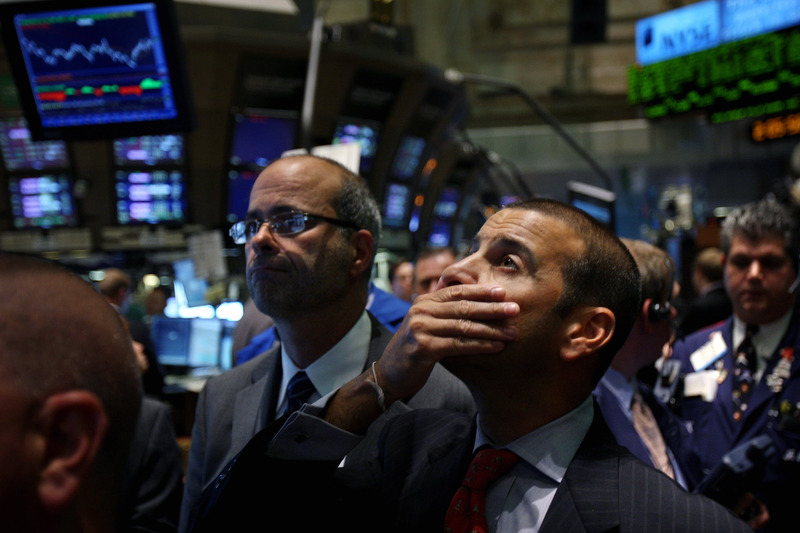 One theory of economics says that any market can return to a point where it has been in the past. The Great Recession was, by some measures as bad as the Great Depression. Unemployment was 3.6% in November 1966. It was at 4% in December 1999. There is no precedent for zero unemployment, but those two periods came close.
One theory of economics says that any market can return to a point where it has been in the past. The Great Recession was, by some measures as bad as the Great Depression. Unemployment was 3.6% in November 1966. It was at 4% in December 1999. There is no precedent for zero unemployment, but those two periods came close.
Recent movements in the stock market could repeat themselves as the economy lurches toward another recession. The DJIA fell to just below 6,630 on March 2, 2009. Back in October 2007, 17 months earlier, it briefly traded above 14,000. What happened? The most frequent answer is the recession that lasted from December 2007 until June 2009, a period determined by the National Bureau of Economic Research, caused the collapse. The recession lasted 18 months, which made it the longest of any downturn since World War II.
The DJIA could drop below 7,000 again before the middle of next year, down from 12,000 where it trades now. The market fell over 50% last 2008 and 2009. A correction to 7,000 this time would be 42%.
The major drivers of a sharp drop in the DJIA would be:
1. Recovery Is Uneven
Some regions of America are almost economically dead. The first reason the market is likely to plunge is that the current recovery is a 35-state recovery and not a 50-state one. The US economy is not running on all its cylinders now. It runs on about two-thirds of them during a good quarter. There has not been and will not be much of a recovery in Nevada, Michigan, Florida, California, Rhode Island, Ohio, Illinois, Louisiana, South Carolina, and sections of Kentucky, Tennessee, Arizona, Idaho and Mississippi. Some areas of these states lack important growth industries – particularly technology, farming, oil drilling, or the large employment bases that accompany federal and state government employee concentrations. Many areas that counted on construction to bolster their economy can no longer do so. Unemployment will stay at or above 10% in parts of these states and large cities like Las Vegas, Detroit, Stockton, and Providence. Most have negative GDP growth. The US economy cannot grow at a rate of 3% or better, which some economists are forecasting for the second half of the year, if large regions of the country are shrinking economically.
2. Underwater mortgages
More than a quarter of US mortgages are underwater. Economists use several ways to measure the housing market disaster such as foreclosures, delinquencies, home price drops, housing start and new and existing home sales. None of these captures the heart of the market the way underwater mortgages statistics do. A home with an upside down loan can rarely be sold without the seller taking a huge financial hit. These homes are likely to become a financial burden to the homeowners who cannot afford their mortgages and see no hope that their houses will ever regain their value. Housing expert Robert Shiller says home prices could drop another 10% this year. The ripple effect from a rise in underwater mortgages will affect everything from bank earnings to consumer credit to consumer spending. The real estate problem is a drag on the economy and it is one that will get worse.
3. Stocks are expensive
Many market analysts believe that this is nearly a perfect time to buy stocks. Yields on bonds are low. Gold price are unstable. The S&P 500 EPS will be $100 this year based on many forecasts. Is a twelve multiple on that inexpensive? Perhaps. But if so, that indicates that the Dow should be trading about where it is now. S&P 500 earnings, however, will start to decline soon and in some industries they will disappear entirely. The process has already begun among consumer products companies, retailers, grocery chains, and transportation companies like airlines. Even tech firms like Oracle have signaled that growth has slowed. Jim Cramer mentioned a long list of “cheap” shares on “Mad Money” in October 2007. Stock looked “inexpensive” in late 2007. That only lasted until corporate earnings collapsed.
4. Inflation is a problem
No matter what the Federal Reserve says, inflation is in full bloom. The Bank for International Settlements just warned policymakers and world leaders that central banks need to raise interest rates. Otherwise, the BIS stated, the price of commodities will continue to march higher. Chinese inflation hit a 34-month high in May despite rapid tightening by banks there. The core of this rise was food prices, which were up 11.7% for the month. The US cannot claim, at least for long, that it is one world and Asia, Africa, the Indian subcontinent, and parts of South America are another. The prices of critical commodities such as wheat, corn, oil, and cotton are well above where they were two years ago, and with some occasional dips, are still rising. Americans cannot afford higher and higher food and clothing prices when their median incomes are not moving up. Inflation is a poison to consumer spending and to the profit margins of companies that have commodities or transportation-based businesses.
5. Companies hording
Companies are still holding their cash. A McKinsey and Co. report published in May stated that European and US companies have excess cash of more than $2 trillion. Firms like Apple and Google have accumulated multi-billion dollar cash hordes and have elected to hold that money even at extremely low yields. Other firms like McDonald’s have elected to distribute cash through share buybacks and high dividends. Most major banks have raised or reinstated dividends. Cisco has begun to pay a dividend. Companies as diverse as CVS/Caremark Corp., Family Dollar Stores Inc., and Schlumberger Ltd. have raised their payouts. Dividends help people who own a lot of shares in the companies in question. They do nearly nothing for people who hold small portfolios or who are broke and unemployed. Cash not used to create jobs either directly through hiring or indirectly through capital expenditure does not help the economy.
6. Everyone’s shedding their workforce
Companies are no longer adding jobs and governments are laying off employees. The May unemployment numbers told a story of a stagnant job market. Recent jobless claim levels have confirmed it. The private sector has become worried about GDP which has only grown by 2% recently. That is not enough for many firms to decide to add significant numbers of workers. And, unemployment rates are now being moved higher by government layoffs, a result of the “new austerity.” The new federal government budget is likely to make matters worse. The Brookings Institution recently said in its Government Employment and Economic Recovery that the single biggest threat to the economic recovery of many cities is layoffs of government workers.
7. China’s slowing economy
China’s economy will slow considerably. The economic dynamics of China combine high food costs with faltering purchasing and manufacturing. China’s factory output is no longer growing and it is entering what it would view as a recession by the standards of the People’s Republic–a growth rate well below its typical 10% of better. Goldman Sachs recently chopped its forecast for China GDP. High oil prices contribute according to the investment bank. Faltering demand for China’s exports is another. American exports to China rose 32% in 2010 to a record $91.9 billion, and have surged 468% over the past decade, according to the U.S.- China Business Council. Americans usually complain about the heavy flow of China exports to the US. But, many American industrial and service firms need China sales to bolster their bottom lines.
8. Greece is tanking
Greece will go under and take many other small EU nations with it. Austerity measures by Greece will not save it from default according to most credit experts. Even if budget and wage cuts buy the nation some time, the lack of stimulus will ruin a job market which already has a 40% unemployment rate among its youth. Ireland and Portugal have similar problems. A series of defaults among the nations may damage the bank and credit system more than the collapse of Lehman. It will certainly decimate earnings and balance sheets of many European banks. The EU portion of the global bank system could go into a state of shock that would cripple the global credit process. Another by-product of ruined banks is that access to the capital needed to drive economic growth will disappear. A sharp slowdown of EU consumer spending will cripple the US export economy, particularly if combined with a slowdown in China.
Douglas A. McIntyre
Get Ready To Retire (Sponsored)
Start by taking a quick retirement quiz from SmartAsset that will match you with up to 3 financial advisors that serve your area and beyond in 5 minutes, or less.
Each advisor has been vetted by SmartAsset and is held to a fiduciary standard to act in your best interests.
Here’s how it works:
1. Answer SmartAsset advisor match quiz
2. Review your pre-screened matches at your leisure. Check out the advisors’ profiles.
3. Speak with advisors at no cost to you. Have an introductory call on the phone or introduction in person and choose whom to work with in the future
Thank you for reading! Have some feedback for us?
Contact the 24/7 Wall St. editorial team.


